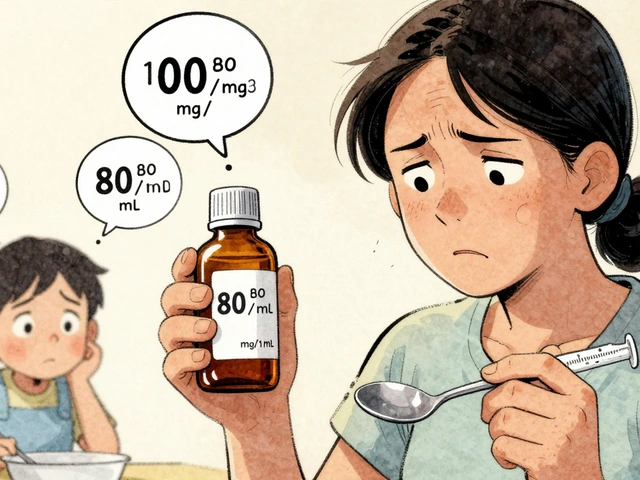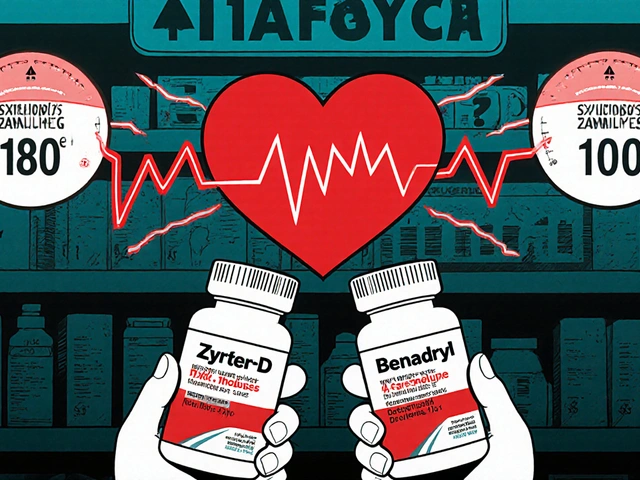Introduction to Clarithromycin and Helicobacter Pylori
In this article, we will be exploring the role of clarithromycin in treating Helicobacter pylori infections, a common bacterial infection that affects the stomach lining. We will discuss the various ways clarithromycin can be used in treatment, the possible side effects, and the precautions one should take when using this antibiotic. So, let's dive right in!
Understanding Helicobacter Pylori Infections
Helicobacter pylori, also known as H. pylori, is a type of bacteria that can cause various stomach and digestive issues, including gastritis, peptic ulcers, and even stomach cancer in some cases. It is estimated that about half of the world's population carries H. pylori, but not everyone will develop symptoms or complications. When the infection does cause problems, it is essential to treat it effectively to prevent further damage to the stomach lining and the development of more severe conditions.
Clarithromycin: A Key Player in H. Pylori Treatment
Clarithromycin is a type of antibiotic belonging to the macrolide class. It is widely used in treating various bacterial infections, including respiratory and skin infections. In the context of H. pylori infections, clarithromycin plays a crucial role in eradicating the bacteria and allowing the stomach lining to heal. It does so by inhibiting the bacteria's protein synthesis, which ultimately leads to their death.
Standard Triple Therapy: Combining Clarithromycin with Other Medications
When it comes to treating H. pylori infections, clarithromycin is often not used alone. Instead, it is combined with other medications in a regimen known as standard triple therapy. This therapy typically includes clarithromycin, a proton pump inhibitor (such as omeprazole or lansoprazole), and another antibiotic, usually amoxicillin or metronidazole. The combination of these drugs allows for a more effective treatment, as they work together to eliminate the bacteria and reduce stomach acid production to promote healing.
Alternative Therapies for H. Pylori Infections
While standard triple therapy is effective in most cases, some patients may require alternative treatments due to antibiotic resistance or intolerance to certain medications. In these cases, healthcare providers may recommend bismuth quadruple therapy or sequential therapy. Bismuth quadruple therapy includes a bismuth subsalicylate compound, a proton pump inhibitor, and two antibiotics (usually metronidazole and tetracycline). Sequential therapy involves taking a proton pump inhibitor and amoxicillin for five days, followed by a proton pump inhibitor, clarithromycin, and metronidazole for another five days.
Potential Side Effects of Clarithromycin
As with any medication, clarithromycin can cause side effects in some patients. The most common side effects include nausea, vomiting, diarrhea, stomach pain, and changes in taste. In most cases, these side effects are mild and resolve on their own once the medication is discontinued. However, if you experience severe or persistent side effects, it is essential to contact your healthcare provider to discuss your options and possibly adjust your treatment plan.
Precautions to Take When Using Clarithromycin
Before starting clarithromycin as part of your H. pylori treatment, it is crucial to inform your healthcare provider of any other medications you are currently taking, as interactions may occur. Additionally, if you have a history of liver or kidney disease, heart issues, or myasthenia gravis, make sure to discuss these with your healthcare provider, as adjustments may need to be made to your treatment plan. Pregnant and breastfeeding women should also consult their healthcare provider before using clarithromycin, as the safety of this medication during pregnancy and breastfeeding is not well established.
Monitoring Your Progress and Ensuring Successful Treatment
While undergoing treatment for H. pylori, it is essential to follow your healthcare provider's instructions closely and take all prescribed medications as directed. This will give you the best chance of successfully eradicating the bacteria and allowing your stomach lining to heal. After completing your treatment, your healthcare provider may recommend a follow-up test to confirm that the infection has been successfully cleared. This test is usually performed four weeks or more after the completion of therapy to ensure accurate results.
Conclusion
Clarithromycin plays a vital role in treating H. pylori infections, often as part of standard triple therapy or alternative treatment regimens. While side effects and precautions should be considered, this antibiotic is generally effective and well-tolerated by most patients. By following your healthcare provider's instructions and monitoring your progress, you can successfully treat your H. pylori infection and restore your digestive health.





Leo Lee
This article is fine and all, but let's be real - clarithromycin is becoming useless in half the world because of overprescribing. I've seen patients with H. pylori who've taken it three times and it didn't touch the bacteria. Doctors need to stop treating this like a simple cold.
Isabel Piaggi
i read this and thought wow this is so important but also like… why do we even need antibiotics for this? i mean… what if the bacteria is just trying to tell us something?? 🤔 maybe our stomachs are just outta balance??
Tom McInnes
The standard triple therapy remains the gold standard. Clarithromycin resistance is rising, yes, but adherence and proper dosing are still the biggest variables.
Stephanie Cepero
I just want to say how important it is to listen to your body during this treatment… I had terrible nausea, and my doctor didn’t take it seriously at first… but when I pushed back, we switched to bismuth quadruple… and it worked. You deserve to feel heard.
Michael Tribone
Hey everyone - if you’re going through this, you’re not alone. I beat H. pylori last year with triple therapy and now I eat spicy food like a boss. It’s tough, but totally doable. You got this 💪
Nancy Lowry
Of course you’re all talking about clarithromycin like it’s some miracle drug. Did you even read the FDA warnings? This antibiotic is linked to QT prolongation and sudden cardiac death in elderly patients. People are dying because doctors treat this like a trivial stomach bug.
Khanyisa Mhlongo
Ohhh my gosh, I just finished my treatment and I’m still tasting metal like I licked a battery 😅 But honestly? Worth it. My stomach hasn’t felt this light in years. I’m dancing in my kitchen right now, eating toast with avocado. Life is beautiful 🌈✨
Manvika Gupta
i used clarithromycin in india and it worked great but my friend took it in usa and it did nothing… maybe its the strain? or maybe the medicine is different? i dont know but it works for me
Chloe McDonald
I didn’t even know H. pylori was a thing until I got tested. Now I’m obsessed with gut health. Probiotics, no sugar, and I drink bone broth daily. My acid reflux is gone. This article was a game changer.
Hobert Finn Bodfish
Clarithromycin? Pfft. That’s 2010 medicine. Everyone knows you need rifaximin + furazolidone + a gut cleanse with activated charcoal. And stop drinking coffee. I’ve cured 12 people this way. You’re all behind the curve. 😏
Andrea Galetto
I read this article and immediately felt the intellectual laziness of mainstream gastroenterology. Why are we still using antibiotics as first-line? We have phage therapy. We have microbiome transplants. This is 2024. Why are we still in the 1990s?
Daniel Rogers
You’re all overthinking this. Take the meds. Eat plain rice. Drink water. Sleep. You’ll be fine. I did it. You can too. 🙌
Chris Remo
My cousin took clarithromycin and got diarrhea for three weeks. He said it felt like his insides were on a rollercoaster. But he’s fine now. Just… maybe don’t eat spicy food for a bit? Just saying.
Michael Herr
The data shows clarithromycin resistance exceeds 20% in urban centers. Triple therapy failure rates are rising. We need to update guidelines. This isn’t opinion. This is epidemiology.
Crystal Magnant
I just took my last pill. I’m so proud of myself. 🥹 I cried when I saw the follow-up test result. My stomach is finally quiet. Thank you to everyone who shared their stories. You helped me keep going.
Danie Joy
Wait… what if H. pylori isn’t a bacteria at all? What if it’s a biofilm created by glyphosate in our food? And what if clarithromycin is just a distraction from the real enemy - Big Pharma? The government doesn’t want you to know this…
Katherine Stapp
America needs to stop letting foreigners prescribe our medicine. In my country, we don’t need this nonsense. We use garlic, honey, and prayer. Why are we letting doctors turn us into chemical zombies?